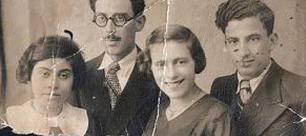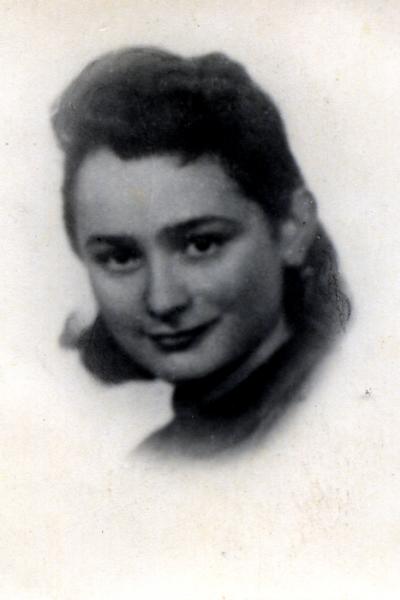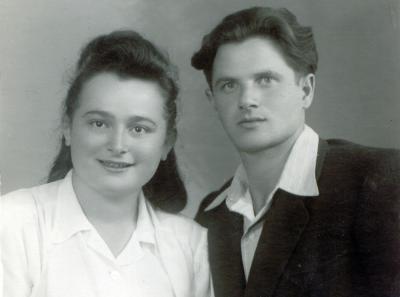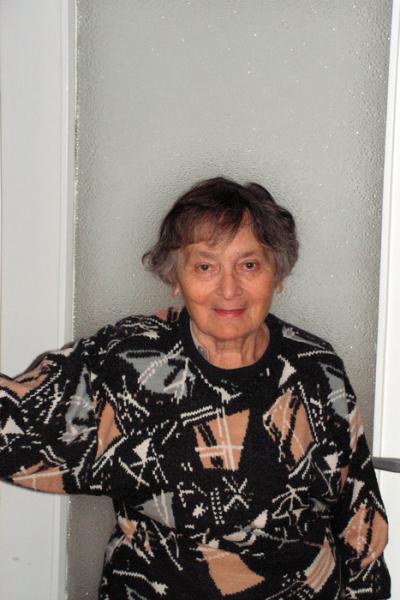From the Centropa Biographies - Gizela Fudem

Gizela Fudemr
Born 1924 in Tarnow
Country: Poland
City: Wroclaw
Interviewer: Jakub Rajchman
Year of interview: 2005

Gizela Fudem in 1940. Tarnow, Poland
We were still alone in our apartment, but at the end of 1940 or at the beginning of 1941, they started evicting Jews from certain areas, and also an entire transport of Jews came, I think from Plock. And the Jewish community had to place them somewhere. And because we had two rooms, they took one room away from us and put a family of five there. nto ours.
It was really crowded, and those people were completely different. The girls were going out with boys and they were not the kind of people we would associate with.
That was already 1942 and then the first big action [liquidation of Jews] took place during which a lot of people died. We managed to survive because Germans would search by last name, and if they found someone, they would take everyone that lived there. And we weren't on that list. During that first action a lot of people were taken away, many shot on the spot, in apartments or in the yards. And many were taken to the Polish cemetery and shot there. The rest was taken somewhere not too far, to some river, it was the Biala River, I think, and shot there. It was the first mass execution.
Before the first action [June 1942] the ghetto wasn't closed yet, and our house remained in the ghetto. But after that action the ghetto got smaller and was surrounded by a partition and the house we lived in was outside the ghetto. So then we had to move.
We survived the second action [in September1942], because we all went into hiding. My sister and I hid in one of the basements in our house. I remember that after the last people entered that hiding place, someone on the outside bricked up the entrance. And we managed to save ourselves, and it so happened that Mom and my brother were somewhere else, in some hiding place on Starodabrowska Street, and Dad was somewhere else yet. Dad used to work somewhere, but I don't remember now where it was.
During the third action [in November 1942] I lost my family, only my sister survived. It was in the fall of 1942. On the day of the action my sister went to work, I had escaped from the ghetto a week earlier and stayed at that school friend's of mine, Gabriela, her maiden name was Niedojadlo. My sister told me later how it happened. It turned out that our parents were hiding in the same basement as I had with my sister during the previous action, but someone informed on them. It was someone who was taken away. He was at the train station and said he would tell where the Jews were. He was a Jew as well. He thought he would save himself.
There was even this one incident where a son, who was in the Jewish police, informed on his own mother, he said where she was hiding. He went to that shelter where his mother was hiding and said, 'Don't be afraid, come out, don't be afraid. Come out, don't be afraid, you'll be fine.' And that mother came out. And later they were teasing him when he was leading people to work, someone from the first row would call this text: 'Come out, don't be afraid', and someone else called: 'You'll be fine' and they'd repeat it, and he would turn back, but could never catch the one who was teasing him.
I knew that there would be another action, I don't know from where, but most of us knew, they were talking about it, predicting, sometimes not exactly, sometimes it was earlier than they were saying it would be, and sometimes a few days later, but we knew it would happen. When they started talking that an action is about to happen, I left the ghetto on Sunday and on the next day they took my parents and my brother. I remember I said good bye to the parents, and my brother was crying very bitterly, asking me to take him with me, but it was out of the question for several reasons. Besides, Dad didn't approve of me leaving, but he said that since I decided to do so, when it's a matter of life and death, he cannot say no. But he thought I should share everyone's destiny, I shouldn't be looking for another fate.
After all the good bye's I got in touch with that friend of mine, Gabriela. I saw her a couple of times when they took us to work outside the ghetto. Because my sister and I worked at a German company, Madritsch, where we sewed. And that friend lived on Lwowska Street, which was the ghetto's border, and where that shop I worked in was. And that girl came by to see me at work a few times, and even offered to hide me in case I needed it, but first she had to make sure her mother agreed. They were very nice people, her mother agreed.
That Saturday I got in touch with that friend on the other side of the fence. I called some kid and told him he'd get money from me if he went to the store where my friend worked. She came and we decided she would come the next day, on Sunday - we worked half a day on Sundays as well - that she would come there, to Lwowska Street, to my work and she would get me out. I didn't have any right to be there that Sunday, because during the second action I didn't get a stamp, my sister did and I didn't, so I lost the right to leaving. But since those people who let us work knew me by sight, and they didn't know yet who was allowed to leave and who wasn't, I came out and stayed there. I stayed in the washroom upstairs and stood there for a few hours until it turned dark outside.
And that friend picked me up from there. With great trouble, because the gate was locked, she lied to the gatekeeper, told him some story so that he'd let her in, and she was very afraid later how we were going to leave. She came and said [to the gatekeeper] that she needed to use the bathroom, all of a sudden, in a house where the gate was locked. And the gatekeeper didn't know what she wanted, let her in, but told her to go downstairs, quickly.
However, she knew I was upstairs and ran upstairs. She found me and said 'Jesus, Maria, what am I going to do now? He saw me, he opened the gate.' I prepared some money. She went first, and he wanted to lock the gate behind her, but then he saw that one had come in, but two were leaving! He didn't know what was going on. And I pushed the money into his hand and ran off immediately, she held my arm and we left - in the evening, without an armband [14] on. And that's how I got to her place.
This is how I managed to escape. But I didn't have the proper papers and I couldn't go anywhere and leave there. I got myself some sort of an ID, but it wasn't a 'Kennkarte' which was needed in order to move around freely. I needed money for that, but I couldn't afford it at the time. So I obtained a false 'Ausweis' using her first and last name, and with these papers I couldn't stay at her place officially, so I had to hide.
A week after my escape the third action took place in the ghetto. My sister was at work and when she came back, our parents and our brother were gone; they had taken them in the meantime. I stayed at that friend's for the next few weeks. But my sister was in despair and wanted me to come back, because she couldn't live alone in the empty apartment. And when it turned out that I couldn't go anywhere, I decided to go back to the ghetto. I kept telling myself that if I go back and manage to get myself a false 'Kennkarte,' I'll still leave the ghetto. And so I just went back to the ghetto, a brother of my friend took me back in; I went into the ghetto along with the people coming back from work.
My parents and my brother died in Belzec. I know it because Gabriela's brothers worked at the train station, and I heard while I was at her place, that they had to take cars with Jews to Belzec and the Germans ordered them to wait there and after some time gave them empty cars back.
When I went back to the ghetto I didn't have permission to work, and with the greatest effort I managed to go back to the same company. I worked there with my sister for one more year, until the end of the summer of 1943. We lived in a house near the ghetto's border, on Lwowska Street, we got the entire house, we were six to eight girls living in one room. The ghetto was divided into two parts - for those who worked and those who didn't, and we lived in that first part, until the ghetto liquidation at the turn of summer and fall 1943. [Editor's note: the complete liquidation of the ghetto took place in November 1943.]
Later it turned out it wasn't a total liquidation, but they moved most of the people. First they kept us at a bus station for two days in a row. We had to kneel. On the first day they took people to the camp in Plaszow and on the second day the rest of the people went straight to Auschwitz and nobody survived there.
We lived in barracks, 100, maybe 200 people in each, I don't remember exactly. The food at Madritsch's wasn't too bad because he organized some extra bread. And it wasn't that clay that we used to get, but for his employees they were bringing food somewhere from the outside and we used to get a quarter of a loaf of bread for exceeding the norm. So all of us together, these ones that sewed better, sewed as much as we could, taking work from the ones that sewed slower. For example I sewed more and if I got half a loaf, twice the quarter for being over that norm, then we all shared among everyone.
That's how I managed until August 1944 when they moved us to Auschwitz. A few months earlier came a transport of Hungarian women who had already been to Auschwitz, and from Auschwitz they brought them to Plaszow, I don't know on what conditions. They were shaved and wore some gray dresses and looked out of this world. Later along with that transport they took some people from Plaszow to Auschwitz and they called us 'a Hungarian transport' because there were a lot of them there. There were more of them than us.
In Auschwitz they shaved our heads, took away our clothing and put us in such barracks where there were maybe 100 people.
In Birkenau we stuck together, my sister and I with three more friends we knew from Plaszow. Up until the moment of one transport from Auschwitz, out of which nobody survived, because everyone died in Stutthof. We were all sent to this transport, but my sister and I were saved by our uncle. But those friends went. I remember we were standing on the square, ready to leave. But we managed to get in touch with that uncle on the other side of the fence; he was our neighbor through the fence. He was the second husband of my aunt Bela, Mom's sister, he had recognized us earlier, as soon as we arrived at Auschwitz. We managed to let him know we are in that transport, and he quickly took our tattoo numbers. And almost at the last moment one of those camp officers came, she walked along the row and called out those numbers. We came forward, she checked whether the numbers were right and then said, 'Disappear.' And she told us which way we should go and we went back to the camp, which was almost empty and stayed there for a few more months, until the end of December 1944
On 30th December 1944 my sister and I were taken to Bergen-Belsen in one of the last mass transports. It was such a transport that the one after us went on foot. It was winter and they gave us paper bags we were to put on. We tied them around the neck so that we didn't get cold and also, if someone had something, they would put it in [the bags, to provide insulation from the cold], hay or something, and we went like that for maybe three days.
They put us in barracks where the conditions were very primitive and there were way too many of us in each one. And there, after a fairly short time, starvation began. There was no work, unless someone got lucky and got something to do in the kitchen or the peeling room. I got lucky. I worked in the peeling room for some time. On top of that I had a friend whom I knew from Auschwitz, who worked in the kitchen, and she used to steal some salt from there. You could get anything for salt, salt was at the price of gold. So sometimes I would look after that salt of hers, because otherwise it would have gotten stolen [by prisoners]. They used to steal from one another.
My sister during that time was literally fading away before my eyes. She was three and a half years older than me, but everyone said about her: 'your younger sister.' They thought she's much younger than me, while I was 20 and she was almost 24. But she looked 15, she was looking really bad. I came down with typhus at the camp, but managed to get better, but when she got sick, she was getting worse and worse every day.
During that time there was absolutely no more bread. However, after we got liberated we found entire barracks filled from top to bottom with moldy bread, because they weren't giving us bread and it went bad. Anyway, they hadn't given us bread for entire weeks, since January, February. For the last two, three months we were only getting brewed turnip, with nothing else, not even salt, just like that, half raw.
It was in these conditions that my sister came down with typhus. I remember, she was placed in a so-called 'rewir' [Polish, literally: territory - here hospital ward]. It was like a hospital, so a place where theoretically you could die in peace, but it wasn't quite like that. Two, three women were put in one bed, and full of lice. The lice were so huge that, literally, in my blanket there was a louse on every thread, on every spot. Those blankets literally walked by themselves.
It was in the last period of the war, I would go to see my sister, try to organize something, bring her something, save her. And then the English came, and liberated us. They were a bit late, say, if they had come a week earlier, there would have been a chance. I had a friend whose sister was also in the same state and she rescued her, but really at the last moment. But my sister was like a skeleton then and it was too late for everything. They freed us on 15th April and she died on 23rd April.
We knew what was about to happen a few days before the liberation. People were talking, and Germans were taking off, there were fewer of them, every once in a while some were leaving. We knew the front was getting closer. And when the English came, they said through the speakers not to worry, that we're free. I remember I wasn't even joyful, I had no idea how to be happy. I couldn't believe it was really the end, I wasn't really conscious of anything.
After the liberation they deloused and fed us, and after a while they began moving us to a different place. It was about two, three kilometers from the camp. There were barracks in which Hungarians working for the Germans used to live. They had been sent away and we got an entire town of barracks. Tens of two-storey houses forming these squares. There were also one-storey houses for diners, theaters and administration. Initially they turned most buildings into hospitals. And then more or less it turned into a DP camp, a camp for displaced persons [Editor's note: Prisoners of Nazi concentration camps and other people moved against their will by the German administration during and after the war, were called Displaced Persons and placed in special camps from which they were moving to target places (country of origin, emigration)].
There were also transports of Poles from forced labor camps. At first there was some plan to move us, and they packed some people onto trucks and sent us to the Belgian border; I was among them. First they took us to Diepholz [today Germany, 120km from Hamburg], then from Diepholz to Linge [today Germany, 60km from Cologne], and they kept moving us every few weeks, and then finally they decided to take us back to Bergen-Belsen.
In the meantime they created a camp high school, and I went to such a high school. The teachers taught whatever they knew, so not all subjects were offered. I remember there was no biology. But there was chemistry, because there was a chemist, there was something like physics, there wasn't much of it. During that time refugees from Poland started coming. There were those who survived the war in Russia, or somewhere with Aryan papers, in any case entire transports were coming, and, among others, my future husband, Leon, got there from Russia. He was in Poland and when it turned out he couldn't find anybody, because everyone was killed, he got on a transport to Bergen- Belsen and we met then.
For some time I worked for the English administration of the camp, they created a search office there. They created files and people from all over the world were searching for each other. They were looking for us and we were looking all over the world, so there were many of the staff there, and I typed, because I knew German and English. I remember also I used to type names of the sought-after on cinematic film that was shown in movie theatres before a movie, to help with the search. A few people got found thanks to this.
We didn't have to work and go to school in the camp. It was voluntary. They just fed us, we had these coupons, and there were diners, where we were getting food rations. And when I started working they paid us with cigarettes and chocolate. And you could exchange it somewhere. But at the end, right before we left, there was the first big exchange of that German money which was worth nothing, they would cut off some zeroes and print new money. Then I received my last pay in the search office in marks [German currency], not some cigarettes or something.
The camp was closed and there were gates through which we could normally go out to freedom, but once or twice there were some incidents and they locked those gates as punishment. Once somewhere in the area a cow or a calf got stolen, and they suspected, probably rightly so, that it was stolen by someone from the camp. There were also some demonstrations, when there was that episode with the ship 'Exodus.' We went then to demonstrate to Hamburg, which is where the ship was. [Editor's note: In July 1947 British war ships intercepted on the Palestinian coast the 'Exodus 1947' ship with 4,500 Jewish refugees on board. They were forced to turn back and go to the Marseille harbor in France. Then they had to go to Hamburg in Germany where the police forced them to leave the ship.]

Guzela Fudem with her husband Leon Fudem in 1948. Bergen, Germany.
I married my husband in Bergen. It was on 11th September 1947. We stayed at the camp until 1948, and then decided to go back to Poland. Everyone was advising us against it. But I wanted to study more, and I thought it would only be possible in Poland. Besides, I was very much attached to the language and couldn't really imagine living anywhere else.
I never tried to hide the fact that I'm Jewish. All my Polish co-workers always knew. I even taught them the Hebrew alphabet, I don't know if they still remember, but I taught them to sign their names. I couldn't stand to hide it. When during the war I spent a few weeks on the Aryan side, this false situation, when I couldn't say what I wanted, was very hard for me to stand. That's why later I never hid it again.

Gizela Fudem in 2005. Wroclav, Poland.
